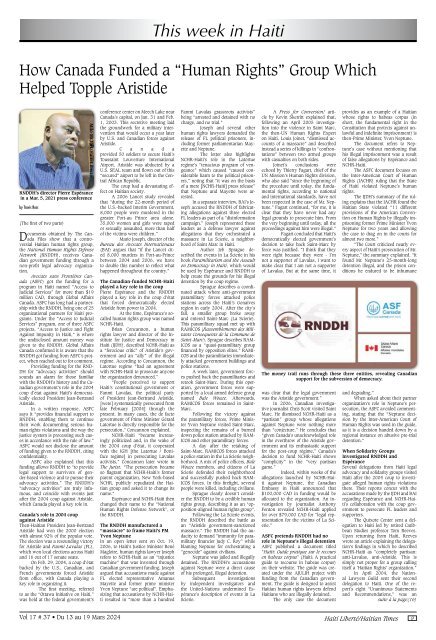Haiti Liberte 13 Mars 2024
Create successful ePaper yourself
Turn your PDF publications into a flip-book with our unique Google optimized e-Paper software.
This week in <strong>Haiti</strong><br />
How Canada Funded a “Human Rights” Group Which<br />
Helped Topple Aristide<br />
by Travis Ross<br />
(The first of two parts)<br />
Milo Milfort/Haïti Liberté<br />
RNDDH’s director Pierre Espérance<br />
in a Mar. 5, 2021 press conference<br />
Documents obtained by The Canada<br />
Files show that a controversial<br />
<strong>Haiti</strong>an human rights group,<br />
the National Human Rights Defense<br />
Network (RNDDH), receives Canadian<br />
government funding through a<br />
non-profit legal advocacy organization.<br />
Avocats sans Frontières Canada<br />
(ASFC) got the funding for a<br />
program in <strong>Haiti</strong> named “Access to<br />
Judicial Services” for more than $19<br />
million CAD, through Global Affairs<br />
Canada. ASFC has long had a partnership<br />
with the RNDDH, being one of 25<br />
organizational partners for <strong>Haiti</strong> programs.<br />
Under the “Access to Judicial<br />
Services” program, one of three ASFC<br />
projects, “Access to Justice and Fight<br />
Against Impunity in <strong>Haiti</strong>,” is where<br />
the undisclosed amount money was<br />
given to the RNDDH. Global Affairs<br />
Canada confirmed it is aware that the<br />
RNDDH got funding from ASFC’s project,<br />
when reached out to for comment.<br />
Providing funding for the RND-<br />
DH for “advocacy activities” should<br />
sounds an alarm for those familiar<br />
with the RNDDH’s history and the Canadian<br />
government’s role in the 2004<br />
coup d’etat against <strong>Haiti</strong>’s democratically<br />
elected President Jean-Bertrand<br />
Aristide.<br />
In a written response, ASFC<br />
says it “provides financial support to<br />
RNDDH, enabling them to continue<br />
their work documenting serious human<br />
rights violations and the way the<br />
justice system is processing such cases<br />
in accordance with the rule of law.”<br />
ASFC would not disclose the amount<br />
of funding given to the RNDDH, citing<br />
confidentiality.<br />
ASFC also explained that this<br />
funding allows RNDDH to “to provide<br />
legal support to survivors of gender-based<br />
violence and to pursue their<br />
advocacy activities.” The RNDDH’s<br />
“advocacy activities” are truly infamous,<br />
and coincide with events just<br />
after the 2004 coup against Aristide,<br />
which Canada played a key role in.<br />
Canada’s role in 2004 coup<br />
against Aristide<br />
Then-<strong>Haiti</strong>an President Jean-Bertrand<br />
Aristide had won the 2000 election<br />
with almost 92% of the popular vote.<br />
The election was a resounding victory<br />
for Aristide and Fanmi Lavalas (FL),<br />
which won local elections across <strong>Haiti</strong><br />
and 16 out of 17 senate seats.<br />
On Feb. 29, 2004, a coup d’état<br />
backed by the U.S., Canadian, and<br />
French governments forced Aristide<br />
from office, with Canada playing a<br />
key role in organizing it.<br />
The first meeting, referred<br />
to as the “Ottawa Initiative on <strong>Haiti</strong>,”<br />
was held at the federal government’s<br />
conference center on Meech Lake near<br />
Canada’s capital, on Jan. 31 and Feb.<br />
1, 2003. This secretive meeting laid<br />
the groundwork for a military intervention<br />
that would occur a year later<br />
by U.S. and Canadian forces against<br />
Aristide.<br />
C a n a d a<br />
provided 50 soldiers to secure <strong>Haiti</strong>’s<br />
Toussaint Louverture International<br />
Airport. Aristide was abducted by a<br />
U.S. SEAL team and flown out of this<br />
“secured” airport to be left in the Central<br />
African Republic.<br />
The coup had a devastating effect<br />
on <strong>Haiti</strong>an society.<br />
A 2006 Lancet study revealed<br />
that “during the 22-month period of<br />
the U.S.-backed Interim Government,<br />
8,000 people were murdered in the<br />
greater Port-au Prince area alone.<br />
35,000 women and girls were raped<br />
or sexually assaulted, more than half<br />
of the victims were children.”<br />
Mario Joseph, director of the<br />
Bureau des Avocats Internationaux<br />
(BAI) argues that “if the Lancet cited<br />
8,000 murders in Port-au-Prince<br />
between 2004 and 2006, we have<br />
to double this number to reflect what<br />
happened throughout the country.”<br />
The Canadian-funded NCHR-<strong>Haiti</strong><br />
played a key role in the coup<br />
Pierre Espérance and the RNDDH<br />
played a key role in the coup d’état<br />
that forced democratically elected<br />
Aristide from power in 2004.<br />
At the time, Espérance’s socalled<br />
human rights group was named<br />
NCHR-<strong>Haiti</strong>.<br />
Brian Concannon, a human<br />
rights lawyer and director of the Institute<br />
for Justice and Democracy in<br />
<strong>Haiti</strong> (IJDH), described NCHR-<strong>Haiti</strong> as<br />
a “ferocious critic” of Aristide’s government<br />
and an “ally” of the illegal<br />
regime. According to Concannon, the<br />
Latortue regime “had an agreement<br />
with NCHR-<strong>Haiti</strong> to prosecute anyone<br />
the organization denounced.”<br />
“People perceived to support<br />
<strong>Haiti</strong>’s constitutional government or<br />
Fanmi Lavalas, the political party<br />
of President Jean-Bertrand Aristide,<br />
[were] systematically persecuted from<br />
late February [2004] through the<br />
present. In many cases, the de facto<br />
government of Prime Minister Gérard<br />
Latortue is directly responsible for the<br />
persecution,” Concannon explained.<br />
NCHR-<strong>Haiti</strong> “became increasingly<br />
politicized and, in the wake of<br />
the 2004 coup d’état, it cooperated<br />
with the IGH [the Latortue / Boniface<br />
regime] in persecuting Lavalas<br />
activists,” Concannon later wrote in<br />
The Jurist. “The persecution became<br />
so flagrant that NCHR-<strong>Haiti</strong>’s former<br />
parent organization, New York-based<br />
NCHR, publicly repudiated the <strong>Haiti</strong>an<br />
group and asked it to change its<br />
name.”<br />
Espérance and NCHR-<strong>Haiti</strong> then<br />
changed their name to the “National<br />
Human Rights Defense Network”, or<br />
the RNDDH.<br />
The RNDDH manufactured a<br />
“massacre” to frame <strong>Haiti</strong>’s PM<br />
Yvon Neptune<br />
In an open letter sent on Oct. 19,<br />
2006, to <strong>Haiti</strong>’s Justice Minister René<br />
Magloire, human rights lawyer Joseph<br />
refers to NCHR-<strong>Haiti</strong> as an “injustice<br />
machine” that was invented through<br />
Canadian government funding. Joseph<br />
argued that accusations made against<br />
FL elected representative Amanus<br />
Mayette and former prime minister<br />
Yvon Neptune “are political”. Emphasizing<br />
that accusations by NCHR-<strong>Haiti</strong><br />
resulted in “more than a hundred<br />
Fanmi Lavalas grassroots activists’’<br />
being “arrested and detained with no<br />
charge, and no trial.”<br />
Joseph and several other<br />
human rights lawyers demanded the<br />
release of FL political prisoners, including<br />
former parliamentarian Mayette<br />
and Neptune.<br />
The letter also highlights<br />
NCHR-<strong>Haiti</strong>’s role in the Latortue<br />
regime’s “tenacious program of vengeance”<br />
which caused “caused considerable<br />
harm to the political prisoners,”<br />
noting that “it was on the basis<br />
of a mere [NCHR-<strong>Haiti</strong>] press release”<br />
that Neptune and Mayette were arrested.<br />
In a separate interview, BAI’s Joseph<br />
accused the RNDDH of fabricating<br />
allegations against three elected<br />
FL leaders as part of a “disinformation<br />
campaign.” Joseph represented these<br />
leaders as a defense lawyer against<br />
allegations that they orchestrated a<br />
massacre in La Scierie, a neighborhood<br />
of Saint Marc in <strong>Haiti</strong>.<br />
Author Jeb Sprague described<br />
the events in La Scierie in his<br />
book Paramilitarism and the Assault<br />
on Democracy in <strong>Haiti</strong>, which would<br />
be used by Espérance and RNDDH to<br />
help create the grounds for his illegal<br />
detention by the coup regime.<br />
Sprague describes a coordinated<br />
attack where anti-government<br />
paramilitary forces attacked police<br />
stations across the <strong>Haiti</strong>’s Gonaïves<br />
region in early 2004. After the city’s<br />
fall, a smaller group broke away<br />
and entered Saint-Marc (La Scierie).<br />
This paramilitary squad met up with<br />
RAMICOS (Rassemblements des Militants<br />
Consequents de la Commune de<br />
Saint-Marc). Sprague describes RAM-<br />
ICOS as a “quasi-paramilitary group<br />
financed by opposition elites.” RAMI-<br />
COS and the paramilitaries immediately<br />
attacked government buildings and<br />
police stations.<br />
A week later, government forces<br />
pushed back the paramilitaries and<br />
retook Saint-Marc. During this operation,<br />
government forces were supported<br />
by a local armed defense group<br />
named Bale Wouze. Afterwards,<br />
RAMICOS forces remained in Saint-<br />
Marc.<br />
Following the victory against<br />
the paramilitary forces, Prime Minister<br />
Yvon Neptune visited Saint-Marc,<br />
inspecting the remains of a burned<br />
down police station attacked by RAM-<br />
ICOS and other paramilitary forces.<br />
A day after the retaking of<br />
Saint-Marc, RAMICOS forces attacked<br />
a police station in the La Scierie neighborhood.<br />
A mix of police officers, Bale<br />
Wouze members, and citizens of La<br />
Scierie defended their neighborhood<br />
and successfully pushed back RAM-<br />
ICOS forces. In this firefight, several<br />
people were killed, including civilians.<br />
Sprague clearly doesn’t consider<br />
the RNDDH to be a credible human<br />
rights group, describing it as an “opposition-aligned<br />
human rights group”.<br />
Following the La Scierie events,<br />
the RNDDH described the battle as<br />
an “Aristide government-sanctioned<br />
massacre.” The RNDDH had the audacity<br />
to demand “immunity for paramilitary<br />
financier Judy C. Roy” while<br />
blaming Neptune for orchestrating a<br />
“genocide” against civilians.<br />
Neptune was jailed and illegally<br />
detained. The RNDDH’s accusations<br />
against Neptune were a direct cause<br />
of his prolonged, illegal detention.<br />
Subsequent investigations<br />
by independent investigators and<br />
the United-Nations undermined Espérance’s<br />
description of events in La<br />
Scierie.<br />
A Press for Conversion! article<br />
by Kevin Skerritt explained that,<br />
following an April 2005 investigation<br />
into the violence in Saint Marc,<br />
the then-UN Human Rights Expert<br />
on <strong>Haiti</strong>, Louis Joinet, “dismissed accounts<br />
of a massacre” and described<br />
instead a series of killings in “confrontations”<br />
between two armed groups<br />
with casualties on both sides.<br />
Joinet’s conclusions were<br />
echoed by Thierry Fagart, chief of the<br />
UN Mission’s Human Rights division,<br />
who also said “since the beginning of<br />
the procedure until today, the fundamental<br />
rights, according to national<br />
and international standards, have not<br />
been respected in the case of Mr. Neptune.”<br />
Fagart continued, “for me, it is<br />
clear that they have never had any<br />
legal grounds to prosecute him. From<br />
the very beginning until today, all the<br />
proceedings against him were illegal.”<br />
Fagart concluded that <strong>Haiti</strong>’s<br />
democratically elected government’s<br />
decision to take back Saint-Marc by<br />
force was justified. “I think that they<br />
were right because they were - I’m<br />
not a supporter of Lavalas, I want to<br />
make clear that I am not a supporter<br />
of Lavalas. But at the same time, it<br />
was clear that the legal government<br />
was the Aristide government.”<br />
In 2006, Canadian investigative<br />
journalist Chris Scott visited Saint<br />
Marc. He dismissed NCHR-<strong>Haiti</strong> as a<br />
“partisan” group whose allegations<br />
against Neptune were nothing more<br />
than “conjecture.” He concludes that<br />
“given Canada’s unacknowledged role<br />
in the overthrow of the Aristide government<br />
and its enthusiastic support<br />
for the post-coup régime,” Canada’s<br />
decision to fund NCHR-<strong>Haiti</strong> shows<br />
“complicity” in the “very partisan<br />
game.”<br />
Indeed, within weeks of the<br />
allegations launched by NCHR-<strong>Haiti</strong><br />
against Neptune, the Canadian<br />
Embassy in <strong>Haiti</strong> announced that<br />
$100,000 CAD in funding would be<br />
allocated to the organization. An investigation<br />
by journalist Anthony<br />
Fenton revealed NCHR-<strong>Haiti</strong> applied<br />
for over $79,000 CAD for “legal representation<br />
for the victims of La Scierie.”<br />
ASFC pretends RNDDH had no<br />
role in Neptune’s illegal detention<br />
ASFC published a document titled<br />
“Haïti: Guide pratique sur le recours<br />
en habeas corpus” (<strong>Haiti</strong>: A practical<br />
guide to recourse in habeas corpus)<br />
on their website. The guide was created<br />
under the AJULIH project with<br />
funding from the Canadian government.<br />
The guide is designed to assist<br />
<strong>Haiti</strong>an human rights lawyers defend<br />
<strong>Haiti</strong>ans who are illegally detained.<br />
The only case the document<br />
provides as an example of a <strong>Haiti</strong>an<br />
whose rights to habeas corpus (in<br />
short, the fundamental right in the<br />
Constitution that protects against unlawful<br />
and indefinite imprisonment) is<br />
then-Prime Minister, Yvon Neptune.<br />
The document refers to Neptune’s<br />
case without mentioning that<br />
his illegal imprisonment was a result<br />
of false allegations by Espérance and<br />
NCHR-<strong>Haiti</strong>.<br />
The ASFC document focuses on<br />
the Inter-American Court of Human<br />
Rights (IACHR) ruling that the State<br />
of <strong>Haiti</strong> violated Neptune’s human<br />
rights.<br />
The IJDH’s summary of the ruling<br />
explains that the IACHR found the<br />
<strong>Haiti</strong>an State violated “11 different<br />
provisions of the American Convention<br />
on Human Rights by illegally imprisoning<br />
former Prime Minister Yvon<br />
Neptune for two years and allowing<br />
the case to drag on in the courts for<br />
almost two more.”<br />
“The Court criticized nearly every<br />
aspect of <strong>Haiti</strong>’s prosecution of Mr.<br />
Neptune,” the summary explained. “It<br />
found Mr. Neptune’s 25-month-long<br />
detention illegal, and the prison conditions<br />
he endured to be inhumane<br />
The money trail runs through these three entities, revealing Canadian<br />
support for the subversion of democracy.<br />
and degrading.”<br />
When asked about their partner<br />
organization’s role in Neptune’s persecution,<br />
the ASFC avoided commenting,<br />
stating that the “Neptune decision<br />
by the Inter-American Court of<br />
Human Rights was used in the guide,<br />
as it is a decision handed down by a<br />
regional instance on abusive pre-trial<br />
detention.”<br />
When Solidarity Groups<br />
Investigated RNDDH and<br />
Espérance<br />
Several delegations from <strong>Haiti</strong> legal<br />
advocacy and solidarity groups visited<br />
<strong>Haiti</strong> after the 2004 coup to investigate<br />
alleged human rights violations<br />
there. Their reports concur with the<br />
accusations made by the IJDH and BAI<br />
regarding Espérance and NCHR-<strong>Haiti</strong>’s<br />
collaboration with the coup government<br />
to persecute FL leaders and<br />
supporters.<br />
The Quixote Center sent a delegation<br />
to <strong>Haiti</strong> led by retired Caribbean<br />
Studies professor Tom Reeves.<br />
Upon returning from <strong>Haiti</strong>, Reeves<br />
wrote an article explaining the delegation’s<br />
findings in which he described<br />
NCHR-<strong>Haiti</strong> as “completely partisan:<br />
anti-Lavalas, anti-Aristide. This is<br />
simply not proper for a group calling<br />
itself a ‘<strong>Haiti</strong>an Rights’ organization.”<br />
In April 2004, the National<br />
Lawyers Guild sent their second<br />
delegation to <strong>Haiti</strong>. One of the report’s<br />
eight “Unanimous Statements<br />
and Recommendations,” was an<br />
suite à la page(16)<br />
Vol 17 # 37 • Du <strong>13</strong> au 19 <strong>Mars</strong> <strong>2024</strong><br />
<strong>Haiti</strong> Liberté/<strong>Haiti</strong>an Times<br />
9














